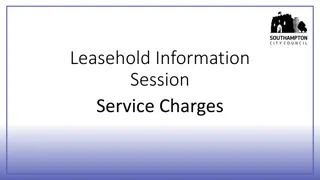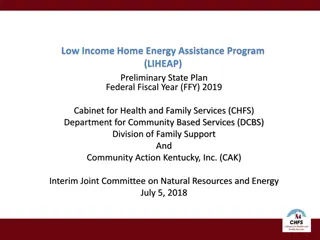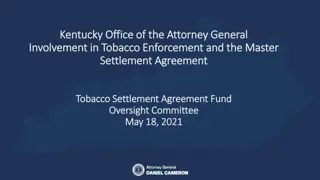A College Student's Guide to Signing a Lease at Western Kentucky University
Explore essential information for college students about signing a lease, covering individual vs. joint leases, the importance of a cosigner, and key details within a lease agreement. Learn how to protect your rights and responsibilities as a renter at Western Kentucky University Student Legal Education Center.
Download Presentation

Please find below an Image/Link to download the presentation.
The content on the website is provided AS IS for your information and personal use only. It may not be sold, licensed, or shared on other websites without obtaining consent from the author. Download presentation by click this link. If you encounter any issues during the download, it is possible that the publisher has removed the file from their server.
E N D
Presentation Transcript
A College Student's Guide to Signing a Lease
We are the Western Kentucky University's Student Legal Education Center Our mission is to improve student academic performance and quality of student life by educating students on their legal rights and responsibilities. SLEC makes accurate legal information easy to access and easy to understand. Who is WKU SLEC? Our Office is in Room 321 in Cherry Hall Contact us with questions at wkusls@wku.edu or 270- 745-4668
Introduction A Lease is a binding contract between you, the renter, and the owner of the property, the landlord. Always read your lease in its entirety before signing. This presentation will cover some of the important information you should consider before signing a lease.
There are two types of leases commonly offered, individual leases and joint leases. Individual leases allow each roommate to sign their own lease with their own move in and move out date. Each roommate will pay their own security deposit and be responsible for damages to their room. Individual leases are the best for students, as they protect you if your roommate fails to pay their rent. You will be responsible for your portion of the rent, and they will be responsible for theirs. Only the individuals who fail to pay their rent risk eviction. Types of Leases Some rental properties will have all roommates sign one joint lease or require "joint and several" liability. This is not preferable, because if a roommate fails to pay their portion of the rent the other roommate/s can be responsible for that remaining portion, or everyone risks eviction.
Before Applying Before applying for a rental, discuss the possibility of needing a cosigner. Many properties will require the resident to prove they make a certain amount of money per month to sign the lease with no cosigner. This amount can differ from place to place, but commonly is 2x or 3x the rent amount for the property. If you do not make enough, you will likely need a cosigner. Your cosigner will also have to prove they make enough to cover your rent, so consider having a parent/guardian/family member cosign your lease. The cosigner is a party with an established financial history who agrees to back up one or more tenants on the lease. They function as a safety net for the landlord. If the other people named in the lease can't make rent or cause damages they can't afford to repair, the cosigner has agreed to pay instead. The cosigner will be held liable for any unpaid rent or damages.
Important Information Within a Lease
Important Information within a Lease Confirm if there are additional costs, such as utilities. Some rentals will include utilities in the rental amount, and some will require you to pay for utilities separately. Pay attention to the duration of the lease. This indicates the amount of time you will be renting the property for. Be aware of important university dates and how those may affect your lease, for example you do not want to end your lease on April 30th if graduation is May 7th, nor do you want to move into the property after the semester begins. Be aware of who is responsible for repairs. It is best to have a lease that ensures the landlord will take care of any issues and repairs necessary. Pay attention to rules on subleasing. Subleasing may be prohibited. If it is allowed, then there may be certain rules or fees associated.
Important Information within a Lease Most rentals require a security deposit. This is an amount paid to the landlord before moving in and will be listed within the lease. The landlord will hold onto this deposit until you move out. After moving out, the landlord will inspect the property for any abnormal damages and use the security deposit to pay for repairs. If you leave the property in good shape, aside from regular wear and tear, you should receive your deposit back after vacating. Confirm the rental amount as well as when rent is due by, how rent should be paid, and if there are fees for late payment. Pay attention to termination stipulations. If you encounter a situation that requires you to break your lease, this will be important. Many rental properties require a termination fee if the lease is broken.
Choose your roommates wisely. Unlike when living in the dorms, most rental properties will not allow for room/roommate changes. Roommates If signing a joint lease, discuss the plan for paying rent and what will happen if an individual cannot pay their rent before signing a lease and moving in. Try to choose trustworthy roommates.
Pets If you have a pet or are considering getting a pet, confirm with the property if pets are allowed and if there are additional pet fees. Pursuant to the federal Fair Housing Act, housing facilities must allow service dogs and emotional support animals, if necessary for a person with a disability to have an equal opportunity to use and enjoy the home. To fall under this provision, you must have a disability and you must have a disability related need for the animal. In other words, the animal must work, perform tasks or services, or alleviate the emotional effects of your disability to qualify. If the property allows pets but charges a pet fee this fee cannot be applied to individuals with an ESA or Service Animal. The property owner can request documentation from a doctor or licensed therapist before allowing you to have an ESA or Service Animal on a property that is pet free, or before waiving the associated pet fee.
The Federal Fair Housing Act prevents discrimination against potential renters based on race, color, national origin, religion, sex (including gender identity and sexual orientation), familial status, and/or disability. Fair Housing Act and Americans with Disabilities Act Under the Fair Housing Act a reasonable accommodation is a change, exception, or adjustment to a rule, policy, practice, or service. The Fair Housing Act makes it unlawful to refuse to make reasonable accommodations to rules, policies, practices, or services when such accommodations may be necessary to afford persons with disabilities an equal opportunity to use and enjoy a dwelling and public and common use areas.
In addition, the Fair Housing Act prohibits a housing provider from refusing to permit, at the expense of the person with a disability, reasonable modifications of existing premises occupied or to be occupied by such person if such modifications may be necessary to afford such person full enjoyment of the premises. Fair Housing Act and ADA Titles II and III of the ADA require public entities and public accommodations to make reasonable modifications to policies, practices, or procedures to avoid discrimination. This obligation applies unless the public entity can demonstrate that the modifications would fundamentally alter the nature of its service, program, or activity (Title II), or the public accommodation can demonstrate that making the modifications would fundamentally alter the nature of the goods, services, facilities, privileges, advantages, or accommodations (Title III).
For more information on the Fair Housing Act and ADA, along with reasonable accommodations, visit https://www.hud.gov/program_offices/fair_ housing_equal_opp/reasonable_accommodatio ns_and_modifications Fair Housing Act and ADA
The Uniform Residential Landlord and Tenant Act is an act adopted at the local level for each city/county.URLTA only applies to residential properties, and it replaces English Common Law. Its purpose is to encourage landlords and tenants to maintain and improve the quality of housing and to make uniform law with respect to the subject of Landlord- Tenant rights among states that enact it. Its enforcement is the duty of the courts. URLTA does not cover institutions, contracts of sale, fraternal / social organizations, hotels or other such lodgings, condominiums, or instances wherein housing is part of employment. Uniform Residential Landlord and Tenant Act URLTA has been adopted in Barbourville, Bellevue, Bromley, Covington, Dayton, Florence, Lexington-Fayette County, Georgetown, Louisville-Jefferson County, Ludlow, Melbourne, Newport, Oldham County, Pulaski County, Shelbyville, Silver Grove, Southgate, Taylor Mill, and Woodlawn have adopted URLTA.
URLTA has not yet been adopted in Bowling Green/Warren County, and therefore the guidelines set in the act do not apply to any leases/rentals in the county. Uniform Residential Landlord and Tenant Act If you would like to read more about URLTA you can do so at https://cms2.revize.com/revize/hopkinsvilleky/services /human_rights/docs/2020/URLTA%20Summary%20(KRS). pdf
Thank you! Contact the WKU SLEC Office or a licensed attorney if you have questions before signing a lease























